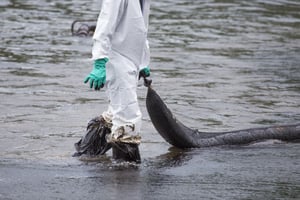
Sucking up our messes, that’s what sorbents do.
Everything from simple drips and leaks, transferring lubricants or fluids, punctured tanks to monumental screw-ups like an oil spill, sorbents come in a variety of sizes and absorption rates. Sometimes, it can get confusing.
In any industry, accidents happen. From manufacturing plants, construction sites, refineries, automotive to small independent shops, chances are that some kind of spill is going to happen. So, here are some of the basics you need to know about sorbents and industrial spill control.
You're going to need a game plan
- Know what could be a spill or leak hazard.
- What protective clothing will you provide workers in the event of a spill?
- How much of a spill do you anticipate happening?
- How are you going to stop the spill?
- How will you minimize risk from acids/bases?
- What are you going to use to clean/contain it?
What is a sorbent and how are they used?
Sorbent Pads: These are an effective and economical way to clean up common accidental spills that may occur in aisles or walkways or due to equipment and machinery. These can come in rolls that are perforated, allowing you to choose the size sorbent you need.
Booms or socks: Booms are an effective way to contain spills from machinery coolants and lubricants, as well as in the water to contain petroleum and chemical spills. These sorbents can be versatile due to their length and often also used to prevent spills from spreading. Often booms are used in oil spills in the ocean and towed by skimmer boats, containing the floating oil and skimming it off the surface of the water.
Pillows: These sorbents can soak up quite a bit of fluid. Generally mold-able, they can be placed in tight spaces or placed directly on top of a spill that has already been contained by a boom or sock.
Keep it simple and remember your colors!
White: These sorbents are oil only and are made up of hydrophobic hydrocarbons like oil, gasoline or diesel. Since these substances tend to cluster together and repel water, these kinds of sorbents are made of woven polyethylene fibers and other inorganic materials that absorb only oil and do not soak up water.
Gray: Gray sorbents are usually made from products containing cellulose or other water-absorbent materials and meant to handle water-based chemicals and solvents. These kinds of spills are typically the most common.
Yellow: Special synthetic sorbents must be used to deal with spills concerning aggressive acids and bases. These yellow sorbents are used to absorb chemical, hazardous or unknown liquid spills.
- Certain areas and applications require more sterilization than others, so things like lint really have no place. For sterile areas or rough surfaces, laminated sorbents are your best bet. High quality sorbent is ultrasonically bonded between two layers of lint-free spun-bound fabric and has the combined ability to sop up spills and keeping lint off of your surfaces.
Spills and leaks should be taken very seriously. Think about the impact it would have on just about everything if safeguards and procedures didn’t exist. Oil and chemical spills endanger public health, drinking water, destroy natural resources, contaminate soil and can bankrupt an entire company.
The EPA and OSHA (29 CFR 1910.120 and 29 CFR 1910.22) have some rigorous standards in place when it comes to dealing with potential spills and leaks. If you are unsure what the laws are in your area, make sure to check OSHA standards, as well as local and federal laws pertaining to spill control. Make sure you are in compliance and can protect your workers and the environment. Contact us if you ever need help!
Having the right sorbents and spill control kits on hand means you can be ready to pitch in and clean up your own mess.
Safety: It's Your Life, It's Our Business








